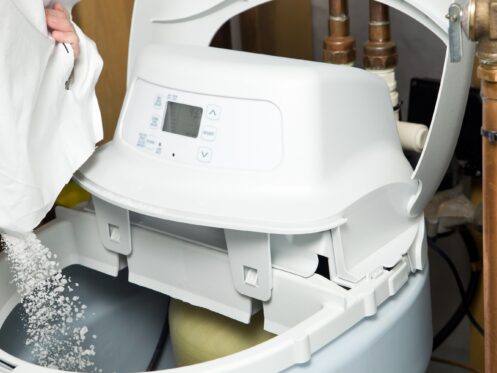Many homeowners invest in whole-home water softener systems to improve water quality and protect their plumbing. These systems remove excess minerals from the water supply, helping to prevent scale buildup and extend the lifespan of household fixtures and appliances. This article will explore how whole-home water softeners work and the potential benefits they offer for your home.
Effects of Hard Water
Hard water can have a significant impact on both your home’s plumbing and your daily life. One of the most noticeable effects is the buildup of limescale, which occurs when excess calcium and magnesium in the water dry on plumbing fixtures like showerheads, faucets, and drains. This mineral buildup not only detracts from the appearance of your home but can also cause long-term damage inside pipes, faucets, and appliances like dishwashers and washing machines.
Another major issue is the strain hard water places on your water heater. As minerals accumulate on heating elements, they form a thick layer of scale. Scale is an insulator, which makes it more difficult for your system to transfer heat to the water. As a result, your water heater has to work harder and consume more energy to achieve the same results, leading to higher energy bills.
In fact, scale buildup can reduce your water heater’s efficiency by up to 30%, which can significantly increase energy costs over time. Additionally, hard water can accelerate wear and corrosion inside the tank, shortening its lifespan by several years.
Beyond plumbing and energy costs, hard water can also affect your daily routine. The minerals left behind by hard water create a residue on your skin and hair, leading to dryness, irritation, and itchiness. Over time, this can even contribute to more serious skin conditions, such as eczema or dermatitis. Hard water also makes hair dull and frizzy, often leading to brittleness and breaking.
Additionally, hard water can make your clothing feel stiff and rough after you do laundry. It also reduces the effectiveness of detergents, making it harder to remove stains. You may also notice stubborn white spots on dishes and glassware, which are caused by the mineral deposits left behind after washing.
How Water Softeners Work
A water softener is specifically designed to remove excess minerals from your water. It works through a process called ion exchange. Water enters the softener and flows through a tank filled with resin beads coated with sodium ions. As the water passes over these beads, the calcium and magnesium ions are attracted to the beads, causing the sodium ions to be released into the water.
A water softener’s brine tank holds a saltwater solution that regenerates the resin beads. During the regeneration process, the brine solution is flushed through the resin tank, displacing the accumulated calcium and magnesium ions with fresh sodium ions. The mineral buildup is then flushed down the drain, and the beads are recharged to continue the ion exchange process. This regeneration typically occurs automatically, ensuring that the water softener is always ready to keep your water soft and your plumbing protected.
While the regeneration process can vary slightly depending on the type of softener, most modern systems use either a time-based or demand-based system to determine when regeneration is needed. This minimizes salt and water usage, keeping maintenance costs low.
Upkeep and Maintenance
To ensure your water softener continues to work efficiently, you’ll need to refill the brine tank with specialized salt every six to eight weeks. In addition, it’s essential to check for salt bridges, which are solid masses of salt that can form in the tank. These can interfere with the softening process, so removing them regularly is a good idea. You should also rinse out the brine tank annually to clear out any accumulated sludge or debris.
For optimal long-term performance, consider scheduling professional maintenance every one to two years. A technician can thoroughly inspect all the components, including the system’s valves, to ensure everything is functioning correctly. With proper maintenance, basic water softeners typically last 8 to 10 years, while higher-end models can last 15 to 20 years.
Contact Your Local Professionals
At TYCO Plumbing, we offer exceptional water softener installation service to the Brighton, CO community. We can also assist with all your water softener repair and maintenance needs, as well as water filtration services. Contact us today to book an appointment with one of our knowledgeable plumbers.



